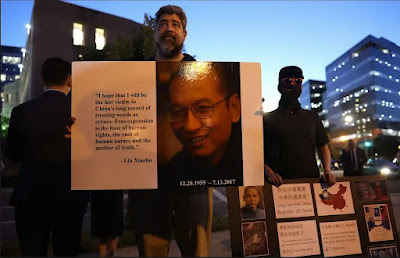The history of man is the history of crimes, and history can repeat. So information is a defense. Through this we can build, we must build, a defense against repetition. - Simon Wiesenthal
Tragically, Chinese Nobel Peace Prize Laureate and human rights defender Liu Xiaobo died eight years ago on July 13, 2017 at the First Hospital of China Medical University, in Shenyang, China after being unjustly imprisoned from December 8, 2008 until his untimely death nearly 10 years later.
It is likely that he died of a cancer made terminal by politically motivated neglect. July 13 marks seven years since his passing. After eight years in "unofficial detention" his widow Liu Xia was finally allowed to leave China on July 10, 2018.
Liu Xiaobo was one of the authors of Charter 08 and signed it along with more than three hundred Chinese citizens. The Charter is a manifesto that was released on December 10, 2008, the 60th anniversary of the adoption of the Universal Declaration of Human Rights. It calls for more freedom of expression, human rights, more democratic elections, the privatization of state enterprises and economic liberalization and would collect over 10,000 signatures.
Charter 08 is reminiscent of the Varela Project that was initially signed by 11,020 Cubans in May of 2002 calling on the Cuban government to respect international human rights norms and engage in the same kind of reforms. Both were inspired by Vaclav Havel and Charter 77. Lamentably, the author of the Varela Project, Oswaldo Payá Sardiñas, founding leader of the Christian Liberation Movement and a youth leader of the same movement, Harold Cepero Escalante were both extrajudicially executed twelve years ago on July 22, 2012 in a crash engineered by the Cuban dictatorship's agents.
The demand for justice remains unfulfilled in all these cases, but we must not despair.
We bear witness embracing truth and memory in defiance of the attempt to whitewash and forget. Holocaust survivor Elie Wiesel explained the importance of doing this in his 1986 Nobel Lecture on why it is important to remember:
"To forget the victims means to kill them a second time. So I couldn't prevent the first death. I surely must be capable of saving them from a second death." ... "There may be times when we are powerless to prevent injustice, but there must never be a time when we fail to protest."
In 2017, I was present at a candlelight vigil in Washington, DC on July 17th organized by the Victims of Communism Memorial Foundation to pay my respects for Liu Xiaobo and demonstrate my solidarity with Chinese human rights defenders.




.jpg)







